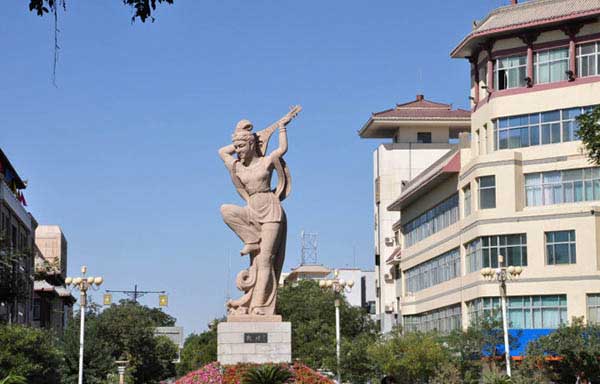- By admin
- In TravelEssentials
- 2015-03-07
Transportation
Major Chinese Airlines
The Civil Aviation Administration of China (CAAC) is the department in charge of the nation's civil aviation industry, which has approximately 1,000 domestic air routes that cover 140 cities with Beijing in the center. There are also 130 international air routes, flying to 60 cities in 40 countries. There are nine major Chinese airlines. There airlines have some of the world's finest aircraft, and all major airports are equipped with the world's best available facilities. The following chart contains the contact information of major domestic airlines in China.
| Code | Airlines | Code | Airlines |
| CA | Air China | CZ | China Southern Airlines |
| MU | China Eastern Airline | HU | Hainan Airline |
| MF | Xiamen Airline | 4G | Shenzhen Airline |
| 3U | Sichuan Airline | SC | Shandong Airline |
| FM | Shanghai Airline |
China railways
The total mileage of China railways open to traffic in China amounts to 100,000km, which forms an extensive network with Beijing as the hub.
Chinese railway service boasts domestic and international operations. The domestic service falls into such categories as quasi-high speed trains, fast trains, tourist trains, expresses, and through passenger trains.
High-speed trains run mainly from Guangzhou to Kowloon and from Guangzhou to Shenzhen. Same-day fast trains shuttle between major cities. Tourist trains make the journey pleasant for those bound for major tourist cities.
The sleeping carriages running on China's railways are partitioned into compartments each containing four cushioned berths arranged in upper and lower berths.
International railway through transport is available on the following routes:
Beijing-Ulan Bator-Moscow;
Beijing-Manzhouli-Moscow;
Beijing-Pyongyang;
Urumqi-Alma Ata;
Beijing-Hanoi;
Beijing-Ulan Bator.
On these routes express passenger trains run in both directions. Just a reminder to European passengers: it takes six to seven days for an express train to reach Beijing from Moscow by way of Ulan Bator or Manzhouli.
China Highways
There are 1.18 million kilometers of highways in China, including 68 national highways. The nation is going full speed ahead in the construction of expressways and first and second-grade motor roads. Construction of expressways and first-and second-class highways are progressing rapidly. Several dozen expressways pivoting on such major cities as Beijing, Shanghai, Shenyang, Guangzhou, Wuhan, Chengdu, Taiyuan and Xi'an have been completed and opened to traffic. Sections of the Lianyungang-Alataw (Xinjiang) Expressway, which runs across the Chinese continent from east to west, and the Beijing-Hong Kong Expressway, cutting through the country from south to north, will begin construction soon.
Impressive improvement had been achieved in China's highway transportation by the end of the 20th century. Provincial capital cities are highway passenger transport centers that operate regular bus services to and from various prefectures, cities, counties and towns in their respective provinces and autonomous regions. The numbers of tourist buses in large and medium-sized cities and sleeper-buses that run across provincial boundaries are on the increase. Expressway transport in China is characterized by top-notch and speedy services and simplified procedures, and express buses are dispatched in a streamlined fashion to guarantee prompt arrival. Most vehicles traveling these expressways are imported or joint venture products that are well designed, comfortably equipped and reliable. Service of these buses is on a par with airline service, and they travel at an average speed of 100 kilometers per hour.
Getting-Around
China is a fascinating destination for world travelers. It can be difficult to explore around the cities without the right information. Here is the quick fact of China city getting around.
Taxi
China enjoys adequate taxi service. In most cities, the taxi tends to be small locally made cars painted red, green or yellow. In large cities, there are luxurious sedans at a higher rate. Taxi fares (normally ranging from RMB1 to RMB2 Yuan per km) vary from city to city but the fare is always clearly marked on the taxi window. Simply raise your hand when a taxi appears. Be sure to choose a taxi with a business permit, and before you disembark from a taxi ride, ask the driver for a receipt. Most taxi drivers do not understand much English, although those in tourist cities are encouraged to learn and speak some simple English. Non-Chinese speaking visitors are advised to have their destinations written down in Chinese and show the address to the cab driver. Your hotel will give you a card with the name in Chinese to give the driver.
Subway
Subways are another convenient means of transportation for those traveling in downtown areas. Subways are available in Beijing, Shanghai, Guangzhou, and Tianjin.
Bicycle
There are bicycles for rent in some hotels in Beijing and some other tourist cities. Riding an old-fashioned rickshaw for a tour of Beijing's Hutongs and back alleys is a delightful experience
China Air Confirmation
If you have reserved a seat to continue your flight in China, or for a return journey on an international or regional flight, you should reconfirm your reservation at least 72 hours before departure if you'll stop over at the boarding place for longer than 72 hours. If you fail to reconfirm, the seat shall be automatically cancelled. No confirmation is necessary if you stop over at the place for your continued flight or return flight for less than 72 hours.
China Air Ticket Validity
Normal fare tickets, whether for single, return or circular trips, are valid for one year. The validity periods of special fare tickets and discount normal fare tickets are calculated on the basis of related fares in accordance with relevant stipulations.
Related destinations
Why Choose Us?
We are the top Silk Road tour operator based in Dunhuang, China. We focus on providing well designed Silk Road China Tours with resonable price and thoughtful service.
- Easy & carefree booking
- The best value
- Great travel experience
- Locally operated
Hot Tours
-

6 days Gansu tour to Binglingsi, Xiahe and Langmusi
Tour type : Private tour Price : from *** Destinations : Lanzhou - linxia - Xiahe - Langmusi - Hezuo - Lanzhou -

12 Days Gansu Highlights Tour
Tour type : Private tour Price : from *** Destinations : Xian – Tianshui – Lanzhou – Xiahe – Langmusi – Hezuo – Zhangye – Jiayuguan - Dunhuang -

10 Days Silk Road Classic Tour
Tour type : Private tour Price : from *** Destinations : Xian - Zhangye - Jiayuguan - Dunhuang - Turpan - Urumqi -

5 Days Zhangye - Alxa youqi Highlights Tour
Tour type : Private Tour Price : from *** Destinations : Zhangye - Alax youqi - Zhangye


